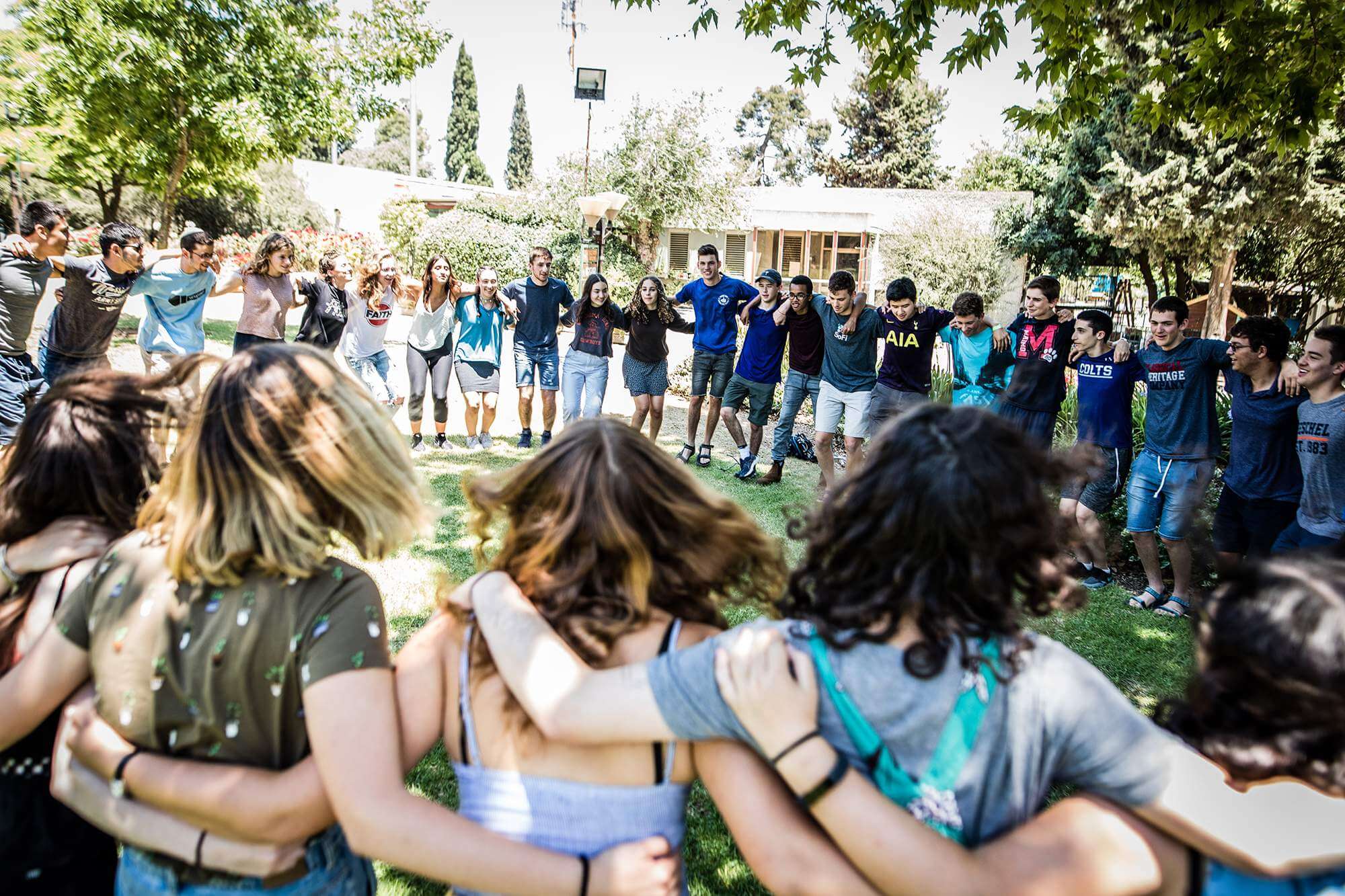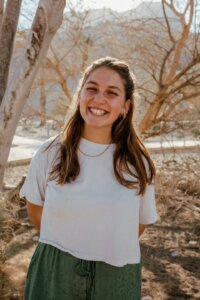Three months out from Oct. 7, young Israelis describe how they’re processing
‘I feel all of the generations of this nation with me,’ shares alum of the Israeli Bronfman program

Three young Israelis reflect on how they’re leaning on one another. Courtesy of Bronfman Fellowship
Editor’s note: The Bronfman Fellowship is an educational program for Jewish high school students from North America and Israel. This is our fourth installment of pieces showcasing the experience of some of Bronfman’s Israeli fellows and alumni since the Oct. 7 terror attack.
‘There is a shared responsibility to defend our people, each of us from our own vantage point’

JERUSALEM — Like many young Israelis, after my army service, I flew off to fulfill my dream of a big trip to the east. I began a period of searching for meaning, self-discovery, simple vacation and adventure after a period of intense military service.
The trip took an unexpected about-face when the war erupted. It was clear to me that the right thing to do was shorten my trip and return home, to give what I could to the cause, to be there for my many friends who are still serving in the army or in the reserves, to be close to my family, and to feel the pain together.
While hiking in India, I met people who asked in astonishment, “Why are you going home? There’s a war there!” For me and another 300,000 Israelis who returned from abroad since the war began, it was clear: When our land is in upheaval, we want to be there, on the battlefront or the homefront.
I exchanged the vistas of India for the hard reality of war. In the first month of the war, my focus was on children who were evacuated from their homes. We tried to create a pleasant and safe space in which laughter and play could provide a break from the trauma they experienced. I was inspired by the resilience of these children as well as their ability to find joy and use their imaginations amid distress.
Now, I am preparing to begin a gig as a counselor in a pre-army preparatory program that’s mixed for secular and religious Israelis, since all of their usual counselors were called up for reserve duty. As a counselor, my role will be to accompany students along their personal and collective journeys in order to prepare them for meaningful army service. And, of course, for their futures as active citizens who contribute to society.
Alongside the feeling of obligation to contribute to my community, a continuous worry accompanies me. Many of my friends, including my partner, are on the battlefield. Many of them, like me, were on their big post-army trip, enjoying their vacation after meaningful military service, and without hesitation returned home to contribute to the war effort with a deep feeling for their mission. The camaraderie we shared a few weeks ago in pursuit of adventure and self-discovery transformed into a shared responsibility to defend our people, each of us from our own vantage point.
From the mountains of India straight to the heart of the struggle in Israel, this trek has had an unexpected nature from working with displaced children to guiding soldiers who are next in line to defend us. Each part tells a story of resilience, obligation, and sacrifice that echoes the feelings of my generation, who, like so many before us, had to report to duty to defend our wounded country.
— Dar Hazan Arnoff, 22
‘If we relinquish living our daily lives, that would be a victory for Hamas’

JERUSALEM — I feel distant from the present situation here in Jerusalem, the city where the “situation” is volatile even when we aren’t at war. I feel too distant. There are almost no sirens here, even though there are sirens on an almost-daily basis in many areas throughout the country. School has resumed and the streets don’t look so different from how they looked on Oct. 6.
Because of this sense of distance, within a few days of the massacre I started to volunteer at any place I could find. I was able to help with hospitality duties, I donated blood for the injured, traveled to greenhouses to help farmers, and volunteered at a hotel that was hosting evacuees from the Gaza Envelope. Nothing is enough and I still feel like my life is too similar to how it looked three months ago. I can’t stop thinking: How can it be that my troubles are limited to submitting school assignments when there are youth my age who lost their entire families, or who were kidnapped into Gaza, or who were murdered?
Despite this, I understand that we all aspire to live in a relatively safe city and that there’s no logic in comparing myself to people who have suffered such immense tragedies. If we relinquish living our daily lives, that would be a victory for Hamas because their goal is to disrupt our regular lives here. I hope that a day will come when we will be able to return to living our lives as we did before the slaughter, with the same sorrows and the same joys, and maybe then we can begin to think of a new path toward peace.
— Itai Ohel Gallili, 17
‘I just feel like I’m not in the right place’

KIBBUTZ MIGDAL OZ, Israel — Writing this is the first time I’m looking back on the past few months as a series of separate incidents rather than as one, long, continuous account. There are a few distinct moments that stand out to me.
There was the moment on Simchat Torah, Oct. 7, when I spent Shabbat with soldiers who were undergoing the conversion process. We celebrated the holiday all together — soldiers, commanding officers, and rabbis. There were sirens; it was a long and emotional day, but when I think back on it I mostly remember the soldiers who took off their white holiday shirts and put on their uniforms. The rabbi blessed them before they got in their cars and drove south. For me, that’s when the war began.
There was also the moment when my husband called to tell me he would be turning off his phone and going into Gaza with his soldiers. He asked me to pray for him and since then, I continue to wonder if my prayers are good enough, protective enough over him.
I was discharged from the army a week ago, after 3.5 years of service as an officer in the education corps. I always thought it would be a moment of release, of freedom, but instead I just feel like I’m not in the right place.
I feel like part of history; I feel all of the generations of this nation with me — leaving Egypt, writing the Mishna, surviving the Shoah, establishing the state of Israel — which gives me strength.
— Chana Galperin, 22
A message from our Publisher & CEO Rachel Fishman Feddersen

I hope you appreciated this article. Before you go, I’d like to ask you to please support the Forward’s award-winning, nonprofit journalism during this critical time.
We’ve set a goal to raise $260,000 by December 31. That’s an ambitious goal, but one that will give us the resources we need to invest in the high quality news, opinion, analysis and cultural coverage that isn’t available anywhere else.
If you feel inspired to make an impact, now is the time to give something back. Join us as a member at your most generous level.
— Rachel Fishman Feddersen, Publisher and CEO























